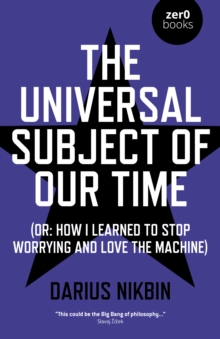
Darius Nikbin, The Universal Subject of Our Time: Or How I Learned to Stop Worrying and Love the Machine, Zero Books, 2019.
read it at Google Books
The Subject itself is the Subject of the Machine. What does it mean to be human? We live in a technological age, where rapid advances in personal tech and the science of Artificial Intelligence are challenging us in ways never before imagined. A book in two parts, The Universal Subject of Our Time begins with an exploration of 20th Century post-modernism's undermining of subjectivity with thinkers such as Foucault, Derrida, Baudrillard and Althusser and continues with a description of the science wars, where physical realists challenged the post-modernists up to the 1990s when the intellectual conflict resulted in an uncompromising stand-off after the Sokal Hoax. In Part II the subject is resurrected by taking a look at arguments for machine intelligence and AI and also, from the perspective of physics, examines what subjectivity means, particularly in relation to black holes or black stars, and look to what lies ahead in the future, in terms of space exploration, Martian habitats and even the possibility of first contact with extra-terrestrials.

No comments:
Post a Comment
Note: Only a member of this blog may post a comment.